THURSDAY, OCTOBER 16, 2025
Gov’ts ‘undisguised coercion’ of lockedout social worker
By NEIL HARTNELL
THE government subjected a 30-year veteran social worker to “undisguised economic coercion” by unlawfully withholding his salary and forcing him to work for free for a year prior to locking him out.
Justice Loren Klein, in a September 15, 2025, verdict ruled that there was no legal or contractual authority to support the Government’s decision to withhold “all the pay” due to Michael Holmes after he refused to be redeployed from Cat Island to New Providence in March 2022.
He rejected the Government’s arguments that General Orders, which govern the Bahamian civil service, as well as the Public Service Commission Regulations and Bahamas Government Human Resources Policies Handbook, gave it sufficient legal justification to act as it did because these only dealt with punishments for officials “absent without leave” and who fail to appear for work.
In contrast, Justice Klein noted that Mr Holmes had continued to report to work for free at his Cat Island offices until locked out on the Government’s orders. Nor was the veteran social worker facing disciplinary proceedings, and he had not been dismissed from his post.
And, ordering that Mr Holmes’ “withheld salary” be restored for the 18-month period between April 1, 2022, to October 16, 2023, the judge also mandated that the “status quo” between the two sides be maintained as he rejected the Government’s assertion that payment would require the Public Treasury to unlawfully “deplete” its resources.
Dismissing all arguments put forward on the Government’s behalf by the Attorney General’s Office, he asserted that it was not well-placed to complain given how Mr Holmes had been treated and subjected to “undisguised economic coercion” to redeploy back to New Providence by withholding his salary.
Justice Klein, in a verdict that will likely raise fresh concerns about how
BUILDING CODE ‘JUST PAPER’ WITHOUT TRUE ENFORCEMENT
By NEIL HARTNELL Tribune Business Editor nhartnell@tribunemedia.net
THE Bahamian Contractors Association’s (BCA) president is arguing “there’s no point” in improving the Building Code without proper enforcement, adding: “We’re good at creating laws we don’t manage.” Leonard Sands, in a recent interview with Tribune Business prior to Clay Sweeting, minister of works and Family Island affairs, tabling coastal infrastructure design and ‘energy efficiency in construction’ guidance notes in the House of Assembly, asserted that while “there’s a regulation for everything” these are “just a bunch of paper” if
not properly executed and enforced.
Voicing his belief that much of the multi-billion dollar damage inflicted by Hurricane Dorian was caused because persons “never followed the Code”, he added: “I’ve said it before and I’ll say it again. There’s no point in upgrading the Building Code. There just needs to be strict adherence to it.
“If you upgrade the Building Code and still don’t regulate building in the country, what’s the point? We’re good at creating legislation that we don’t manage. Upgrading the Building Code will not necessarily change anything
LEGAL REFORMS ‘SHIFT POWER DYNAMIC’ OVER DATA CONTROL
By NEIL HARTNELL Tribune Business Editor nhartnell@tribunemedia.net
BAHAMIAN technology providers said legal reforms debated by the House of Assembly “shift the power dynamics for control of data” as they backed the move to “move with the times”.
Keith Roye II, Plato Alpha Design’s chief operating officer, told Tribune Business that three changes “stick out to me” with the
proposed overhaul of the 22 year-old Data Protection Act including the “expanded rights” provided to Bahamian citizens over how companies manage, handle and secure their personal data.
Noting that the Data Protection Bill means “compliance is no longer optional; it’s mandatory” for businesses such as his own, which manage and process data on behalf of
the Government treats its employees, ruled that the dispute with Mr Holmes erupted after the latter “challenged his transfer from Cat Island to New Providence, which he asserts was done without lawful justification, proper notice or consultation” with the Bahamas Public Services Union (BPSU) that represented him.
“The claimant is a social worker, who has been employed with the Department of Social Services for some 30 years since August 2, 1993,” Justice Klein wrote. “At the point that this matter arose, his annual salary was $29,450.
“During May of 2019, he requested a transfer to Cat Island, apparently with the intention of retiring there. By letter dated January 9, 2020, he was notified that his request for transfer had been approved with effect from January 13, 2020. He thereupon relocated to Cat Island.”
However, barely two years later, Mr Holmes received a letter from social services’ assistant director advising him he was being redeployed back to

‘GLAD IT’S OFF OUR
PLATE’: CABLE CONCEDES OVER $3.358M TAX DISPUTE
By NEIL HARTNELL Tribune Business Editor nhartnell@tribunemedia.net
CABLE Bahamas top executive yesterday asserted “we’re glad to get that off our plate” after the company conceded its tax fight and paid the total $3.538m sought by the Government.
Franklyn Butler, the BISX-listed communications provider’s president and chief executive, told Tribune Business it “made no sense” to continue the battle with the Department of Inland Revenue after the company’s attorneys advised “it is more likely than not” the Bahamian tax authority would win its claim for unpaid VAT and Business Licence fees.
Cable Bahamas’ “strategic decision to settle the dispute and avoid further financial exposure” is disclosed in its just-released financial statements for the year to end-June 2025. Besides giving up its full $2.313m deposit, a sum equal to the disputed taxes and which it had to lodge to pursue its Tax Appeals Commission challenge, it has paid a further $1.225m to ensure post-settlement
“compliance”.
Mr Butler, telling this newspaper that “nobody wants to fight with the tax collectors”, reiterated that Cable Bahamas and its Aliv mobile subsidiary are “glad to have that behind us” and are committed to being “a good corporate partner” that “pays its fair share of taxes” to finance critical public and national infrastructure.
The dispute with the Department of Inland Revenue centred largely on whether VAT was incurred on international inbound roaming and call charges plus insurance proceeds. Cable Bahamas’ share of the payment is $1.039m, comprised of $718,830 that was accrued during the disputed four-and-a-half year period through to end-June 2022, and a further $320,206 incurred between then and settlement.
The majority, amounting to almost $2.5m, was incurred by Aliv. Besides some $1.594m that the Department of Inland Revenue alleged was unpaid and owing for the period between January 1, 2018, and March 31, 2022, a


Bahamas must embrace the payments revolution
IF YOU have walked into a Nassau coffee shop lately and paid with your phone, you have experienced first-hand what is rapidly becoming the new normal. The way money moves around the world - and right here in The Bahamas - is undergoing the most dramatic transformation since the credit card was introduced decades ago.
Gone are the days when cash was king. Today, digital wallets, instant transfers and crypto currencies are reshaping how companies do business and how economies function. For small island nations such as ours, these changes are not just convenient. They are potentially game changing. Globally, digital payment transactions are expected to exceed $10 trillion annually, with mobile payments growing at double-digit rates. For businesses, the advantages are clear: Reduced costs, instant confirmation, better record keeping and faster access to funds. Small businesses can now receive payments instantly instead of waiting days for cheques to clear. Perhaps more importantly, digital payments open doors to new markets.
A local Bahamian artisan can sell hand-crafted goods to customers in Toronto or London as easily as to someone on Bay Street,

ROYE II KEITH
with payment systems handling currency conversion seamlessly. Crypto currency adds another dimension. While Bitcoin grabs headlines with volatile price swings, blockchain technology is quietly revolutionising business transactions. Smart contracts eliminate intermediaries in real estate and supply chains. For international transactions, crypto currency offers speed and lower costs, settling in minutes rather than days with minimal fees. Here is where our story gets particularly interesting. While much of the world debates digital currency’s future, The Bahamas made history in October 2020 as the first country to launch a nationwide central bank
digital currency (CBDC), the Sand Dollar.
Think of it as digital Bahamian dollars, backed by the Central Bank with the same stability as physical cash. But Sand Dollars can be transferred instantly between digital wallets, making transactions faster and more accessible across our archipelago.
The motivation was not just about being first. It was about solving real problems. In a nation spread across 700 islands, traditional banking infrastructure does not reach everywhere. Physical cash transport is expensive and logistically challenging. For Family Island residents, accessing banking often meant boat trips to larger islands.
The Sand Dollar democratises financial access. A business owner on Eleuthera can receive payments just as easily as one in Nassau. A fisherman on Andros can receive immediate payment without needing a traditional bank account. This is financial inclusion in action.
The effects are already emerging. Tourism operators accept payments from international visitors more efficiently without high credit card processing fees. This matters in an economy where tourism accounts for roughly half our gross
JUST 10-15% OF APPLICANTS AWARDED FINANCING BY BDB
By ANNELIA NIXON
Tribune Business Reporter
JUST 10-15 percent of applicants for Bahamas Development Bank (BDB) financing succeed in obtaining funding for their ventures, a senior official disclosed yesterday.
Sumayyah Cargill, the BDB’s acting manager director, told a renewable energy conference organised by the Bahamas Chamber of Commerce and Employers Confederation (BCCEC): “So that means out of every ten applications, maybe one or two is something that we’ll
actually step in and fund.
“I think the biggest issue for small businesses is maybe cash flow isn’t where it needs to be. Collateral isn’t there. The documentation isn’t there. I don’t work in credit... They’re going to ask you things like, ‘Do you
BANK - SEE PAGE NINE

domestic product (GDP) and employs half our workforce.
Local businesses are discovering that younger tourists, who grew up with digital payments, prefer contactless options. Meeting this expectation is about competitiveness in a global market. The real estate sector is exploring how blockchain could streamline property transactions, reducing paperwork and costs while making Bahamian properties more attractive to international buyers.
Of course, challenges remain. Sand Dollar adoption has been slower than hoped, with many Bahamians preferring traditional cash. Trust in new technology takes time to build. There is also the digital divide. While Nassau and Freeport have robust Internet infrastructure, some Family Islands have limited connectivity. Digital payments require reliable Internet access, which is not yet universal. Regulatory questions loom large. How do we protect consumers while preventing money laundering? The Central Bank is working to strike this balance. Meanwhile, many
Bahamian banks remain hesitant about private crypto currencies, citing regulatory uncertainty and volatility.
Despite challenges, the trajectory is clear. Digital payments are not a fading trend. They are becoming the foundation of modern commerce. For The Bahamas, the question is how to maximise benefits for our unique economy.
We have natural advantages. As a major financial centre and tourist destination, we are globally connected. Our technologysavvy population makes implementing new systems manageable. And we have demonstrated leadership with the Sand Dollar.
The opportunity exists to become a regional hub for digital financial innovation.
Imagine Bahamian fintech (financial technology) start-ups developing Caribbean solutions. Picture our tourism sector offering the region’s most seamless payment experiences. For local businesses, the message is simple: Adapt or risk being left behind.
Adopting digital payment systems is easier and more affordable than ever. The infrastructure is in place.
The question is whether
we will seize the moment. Money is becoming invisible, flowing through fibre optics and wireless signals. This transformation is reshaping transactions everywhere - from Silicon Valley to Prince Charles Drive.
For The Bahamas, this represents both challenge and opportunity. We can navigate these waters skillfully, using digital payments to strengthen our economy, improve financial inclusion and maintain our competitive edge. The future of money is digital. With the Sand Dollar already in circulation, we have a head start. Now comes building on that foundation to create a modern, inclusive digital economy for all Bahamians. The revolution is not coming. It is already here. Are we ready to embrace it?
NB: About Keith Keith Roye II is a highly analytic and solutionsdriven professional with extensive experience in software development. He holds a BSc in computer science and his career includes leading and delivering global software projects in various industries in The Bahamas and the US.


Pintard fears red tape on Data Protection Bill
By FAY SIMMONS Tribune Business Reporter jsimmons@tribunemedia.net
THE Opposition’s leader yesterday voiced concerns
that the Data Protection Bill imposes excessive red tape on small businesses and foreign investors. Speaking in Parliament yesterday, Michael Pintard
argued that while the reforms represent a step forward, they fall short of addressing the broader economic and digital challenges facing The Bahamas.


He said the legislation risks discouraging investment at a time when families and businesses are already under pressure.
Mr Pintard pointed to the country’s economic headwinds, including rising unemployment - especially among young people - with nearly 20 percent of households struggling with the cost of living. He warned that adding new regulatory requirements to an already fragile business environment could have unintended consequences.
“We are not falling off the edge of the cliff, nor are we climbing the lofty mountain that we have the capacity to climb as a country. Growth is slowing. Unemployment is rising, youth joblessness. Near 20 percent of families are struggling with the cost of living. And the cost of living is outpacing the wages,” said Mr Pintard.
“This is not the time to add new administrative and legal burdens to small and medium-sized businesses that are fighting to stay afloat in this country.” Mr Pintard said the Bill introduces requirements such as mandatory registration, breach reporting and local representation for foreign entities—measures which may appear minor but can add significant costs and complexity for small firms and foreign investors.
“This Bill, in some ways, adds weight without the required balance. This Bill requires mandatory registration, breach reporting and local representation for foreign entities. These measures may sound harmless on paper, but for small firms they mean new costs, new forms, new risk for

foreign investors,” said Mr Pintard.
“They raise questions about whether The Bahamas is truly open for business. We should be about the business of attracting investment, both local and foreign, not scaring away with red tape and failure to improve on the ease of doing business. A strong data regime should balance rights and responsibilities but not punish growth.”
Mr Pintard acknowledged that the Bill is a necessary and valuable update, introducing modern regulatory oversight. However, he added it does not go far enough in addressing today’s broader digital challenges, such as what happens to citizens’ data when it is stored, processed or monetised abroad.
“This Bill out before us, clearly, is an important update to the original 2003 Act. It establishes a modern regulatory framework that introduces new oversight mechanisms. And, while important, it does not go far
enough,” said Mr Pintard.
“As my colleagues have already underscored, it protects the privacy of Bahamians within our borders, yes, but it does not establish the full sovereign control required in a world where our citizens data may be stored, processed or monetized thousands of miles away.”
Mr Pintard added that The Bahamas needs to adopt a more ambitious, future-focused approach to data privacy and digital policy - one that ensures full sovereignty over citizens’ data and positions the country as a trusted, ethical digital hub on the global stage.
“It does not yet position The Bahamas as a jurisdiction of choice for global citizens who value privacy, digital security and ethical AI to build that reality. We must think beyond the issue of compliance towards constitution protection, data sovereignty and strategic national policy for the digital economy,” said Mr Pintard.


Minnis urges dusting-off micro insurance proposal
By FAY SIMMONS Tribune Business Reporter jsimmons@tribunemedia.net
DR HUBERT Minnis
yesterday urged The Bahamas to develop microhurricane and micro-flood insurance initiatives as part of a broader disaster response strategy.
Speaking in Parliament, the former prime minister said his administration had explored micro-hurricane insurance to support lowincome residents whose homes sustained less than $10,000 in damage from storms. He urged the Davis administration to build on that groundwork.
“During the last hurricane, Hurricane Dorian, we learned a lesson. Many homes were destroyed or damaged and, in many instances, it would appear at least about 50 percent of homes required less than $10,000 to get them back together immediately. We were advancing what we call a micro hurricane insurance for low-income Bahamians,” said Dr Minnis.
“That type of insurance would have given
them access to $10,000 to $15,000 immediately, so that they can get in their homes immediately. The Government can review those files at the Office of the Prime Minister. I ask that he [Philip Davis KC] review those and move forward however they feel is justified.”
Dr Minnis warned that the effects of climate change are accelerating, and will continue to increase the frequency and severity of extreme weather events in The Bahamas. He pointed to the recent widespread flooding across parts of New Providence and other islands as a clear warning sign of what is to come, arguing that the country remains vulnerable and underprepared.
He urged policymakers to take a proactive approach, warning such events are likely to become more common - and more devastating - in the years ahead.
“Not only should he review the micro hurricane insurance, [but] when you look at what is happening around the world now, when you look at the rainfall and the pattern, the weather changes, the
weather pattern… I’m sorry to say, but what we experienced last week is nothing more than basically a piss on the surface of The Bahamas. The big one will come,” said Dr Minnis.
“Therefore, I’m recommending that there will be lots of flooding, and recommending that the Government should move forward with micro flood insurance just like we were proposing, or we were advancing with micro-hurricane insurance, and base it on income means testing for homes.”
Dr Minnis explained that qualifying homeowners would be able to receive $10,000 in immediate financial support following a disaster, enabling them to carry out urgent repairs and replace damaged items.
“Individuals whose interior of their homes and furniture, etc, are damaged as a result of flooding, they would be able to mobilise $10,000 immediately and start replacing their various items that were damaged. These are just ideas. These were things that we looked at, and I think the Government should consider those,” said Dr Minnis.
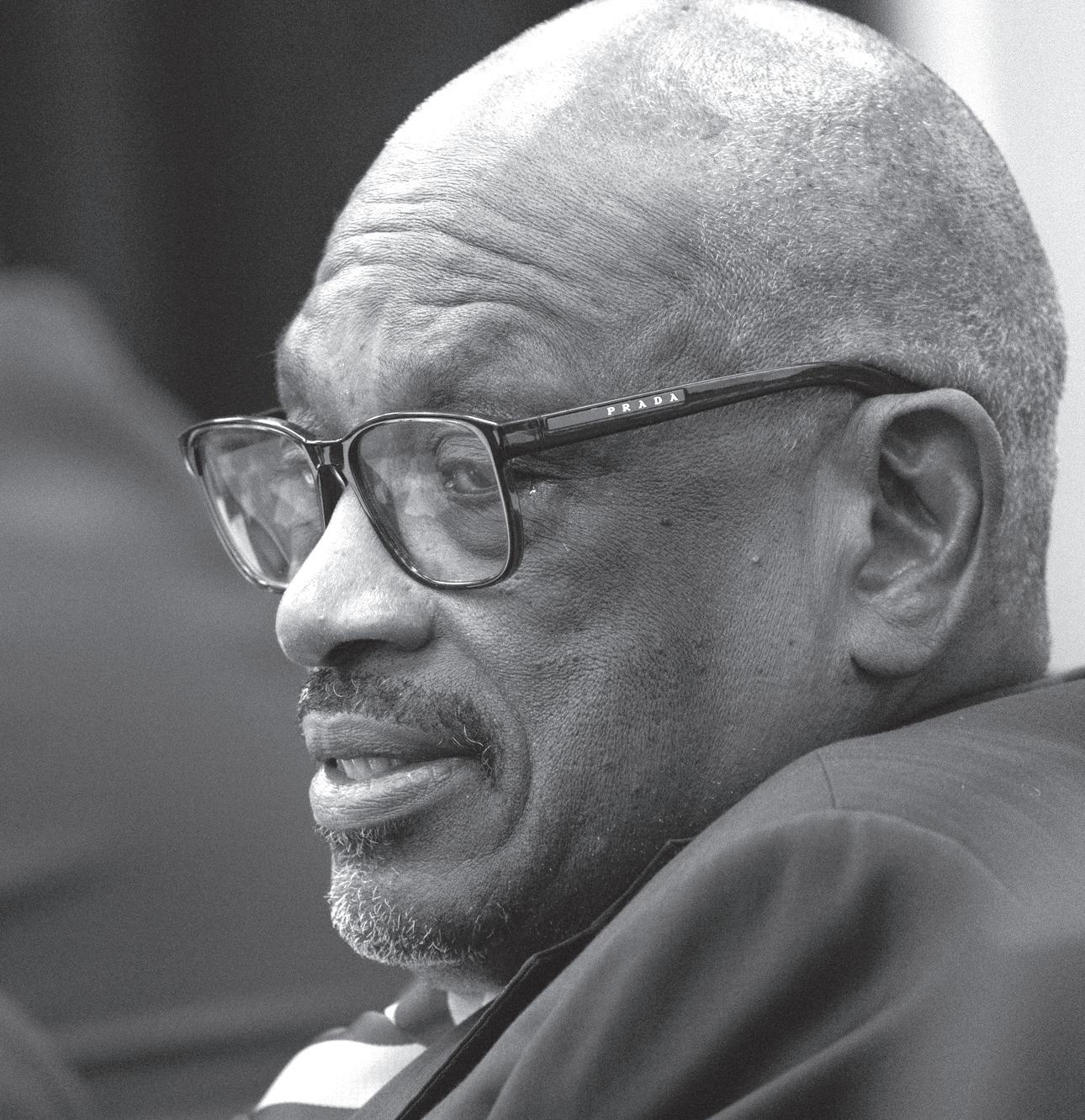
DR HUBERT MINNIS
BPL TARGETS SOLAR’S ARRIVAL IN EARLY ‘27
By ANNELIA NIXON
BAHAMAS Power & Light (BPL) yesterday said households and businesses could benefit from lowercost, cleaner solar energy by the 2027 first quarter.
The state-owned utility, in a statement, said independent power producers (IPP’s) such as INTI Corporation Bahamas and Eco Energy
Bahamas have taken steps towards constructing their New Providence solar farms.
Speaking at INTI’s Youth Energy Forum on Friday, Owen Bethel, its chief executive, confirmed that property for its 20 mega watt (MW) solar farm at BPL’s Blue Hills Power Plant, which is set to come online by early 2027, has been cleared.
“Our staff and equipment
are already on the ground,” Mr Bethel said. “We’ve cleared the property and are preparing for site development. Once complete, this solar farm will feed directly into BPL’s grid, helping provide a constant, cleaner and more reliable power supply to New Providence.”
Vince Pedican, Eco Energy Bahamas’ managing director, said completion of its solar plant at Coral

We are aware of the malicious content currently being circulated about The Cricket Club Restaurant & Pub. As a proud family-run business of over 27 years, we have always been an instrumental part of our community - known for our hospitality, tradition, and dedication to quality service.
The Cricket Club was founded by Constance Robertson and the late Christopher Robertson who shared a vision of bringing an authentic pub experience to The Bahamas. That vision has stood strong for nearly three decades, built on integrity and community spirit.
The claims being spread are false, misreading, and defamatory. We stand frmly by our record and reputation and welcome any proper offcial investigation into the matter. We are confdent that the truth will confrm our longstanding commitment to fairness, respect, and excellence in service.
Thank you to our loyal patrons and community members who continue to support us. - Te
Harbour Farm is expected within 16 to 18 months.
“We’re deeply committed to protecting the environment as we build,” Mr Pedican said. “Our team is actively replanting endangered species and following our Environmental Impact Assessment guidelines to ensure this project contributes to a greener,
more sustainable future.”
Toni Seymour, BPL’s chief executive, added:
“These solar farms will operate in tandem with Battery Energy Storage Systems (BESS) - cleaner, more reliable and resilient energy sources. As the solar panels utilise the sun’s radiance during the day, it’s also charging the BESS which automatically kicks in to provide power once the sun sets.
“This is how we are adding resilient mechanisms to our new energy era regime, and these cleaner sources of energy will also be reflected in lower electricity bills as we rely less on heavy fuel power generation units.”

Patty vendor opens new HQ, signs Jamaica deal
A BAHAMIAN patty vendor has marked the opening of its new Nassau location by signing a distribution agreement with a Jamaican food company and supplier.
Tasty Patties, in a statement, said it has signed a deal with Mother’s Enterprise, creator of the Devon House Patties. Through this partnership, Tasty Patties will serve as the official Bahamian distributor for Mother’s Enterprise products in this nation, including Mother’s Patties and the Devon House brands.
It said customers can now enjoy a variety of flavours - beef, chicken, fish, callaloo and BBQ Pork via the Devon House range, which includes lobster, shrimp, curried goat and BBQ Pork patties.
Tasty Patties has also opened its new location on 34 Nassau Street, at the corner of Delancy Street. Since the site’s soft opening in August, the company has already employed more than a dozen Bahamians and expanded into
wholesale distribution to vendors, schools and hotels.
“We’re thrilled to partner with Mother’s Enterprise to bring both the Mother’s and Devon House brands to The Bahamas,” said Doneth Cartwright, director of Tasty Patties. “This partnership celebrates the best of Caribbean flavour while creating new opportunities for local employment and entrepreneurship.”
Sheldon Seymour, managing director of Mother’s Enterprise, added:, “Our collaboration with Tasty Patties marks an exciting new chapter for Mother’s. We’re proud to see our products reaching more Caribbean customers through a partner that shares our passion for quality and authentic island taste.”
Tasty Patties said the partnership underscores a growing Caribbean-to-Caribbean business connection, bringing authentic Jamaican patties to Bahamian tables.

BAHAMIAN DIVE OPERATOR BACKS ROSEWOOD EXUMA PROJECT HALT
A RENOWNED Bahamian
is calling for the $200m Rosewood Exuma resort project to be halted and further reviewed amid fears it could destroy “one of the last great undersea wonders in the Western world”.
Stuart Cove, owner and operator of Stuart Cove Dive, issued his plea after diving the reefs, sea grasses and waters of Sampson Cay where fish, crawfish and conch spawn, hatch and are protected.
“I was stunned by what I saw and reminded of how rare the beauty of the waters in that area are, and how pristine they remain, and also by the number of conch and mature conch,” said Mr Cove.
“Within the park (the Exuma Cays Land and Sea Park) and around Big Sampson, including the North Bay and the cut, there were more mature conch than I
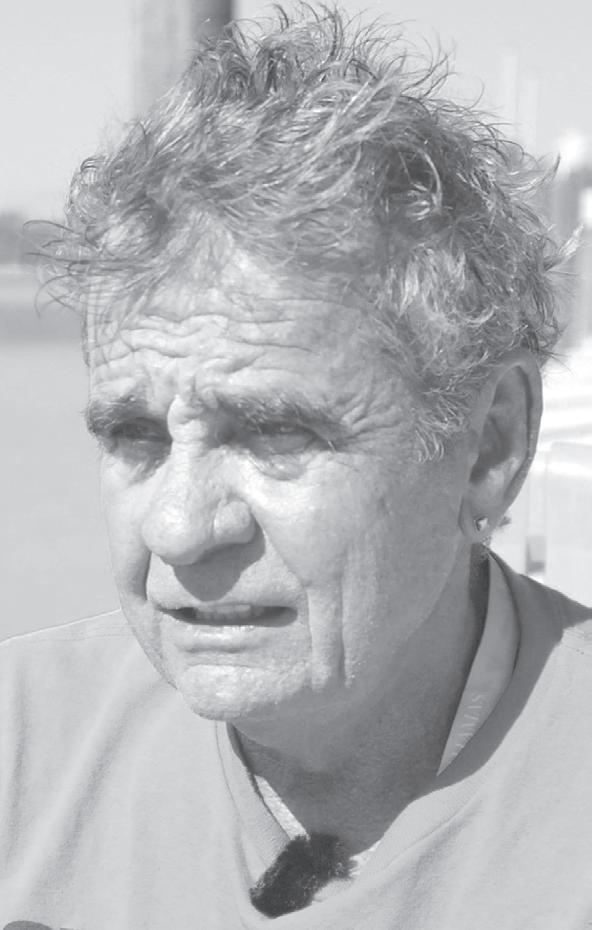
have seen anywhere in years. It was like a haven.
“If we are serious about saving the underwater environment we boast about to the world, the one we show in photos and videos, we need to save the Exuma cays. This is truly a special place on earth and we cannot, must not, allow it to be destroyed.”
Mr Cove, who has exposed more than two million visitors to The Bahamas’ marine environment since he opened Stuart Cove Dive in 1979, said he wants others to share his passion about protecting life beneath the sea.
His concerns add to those already voiced by concerned citizens and businesses, including the Save Exuma Alliance, a group of companies, island operators and residents that have combined to urge a halt to a project they say
is better suited for an island with infrastructure than a small cay. SEA members have expressed concerns that the proposed project by Miami-based developer, Yntegra Group, would hurt the economy, change the culture and impact a quality of life that revolves around the natural environment. They have argued it is “too big and too great a risk”, and want the resort either downsized or relocated to a less fragile area where there is infrastructure to support it.
In late September, the Planning and Subdivision Appeals Board began hearing appeals to approvals granted to Yntegra for the Rosewood-branded project. Those appeals were filed by two parties, the adjacent Turtlegrass Resort & Island Club that was under construction prior to the Yntegra announcement and the operators
and owners of Over Yonder Cay, a neighbouring island.
Together, their investments total nearly $200m, with Turtlegrass saying it will be forced to stop construction and cancel plans to invest another $50m in its lowdensity, solar-powered beachside cottage-style resort if the Yntegra project is approved.
The Yntegra Rosewood project includes two marinas plus a cargo dock, and more than 90 structures. It would accommodate more than 500 people, operate mainly on diesel generators and produce more than 100,000 gallons of sewage and 2.8 tons of garbage per day.
A petition has been launched to halt environmental clearance for the Rosewood project, and has already received more than 6,800 signatures.

BAHAMAS BIDS TO CONVERT CANADA AIRLIFT INTO VISITORS
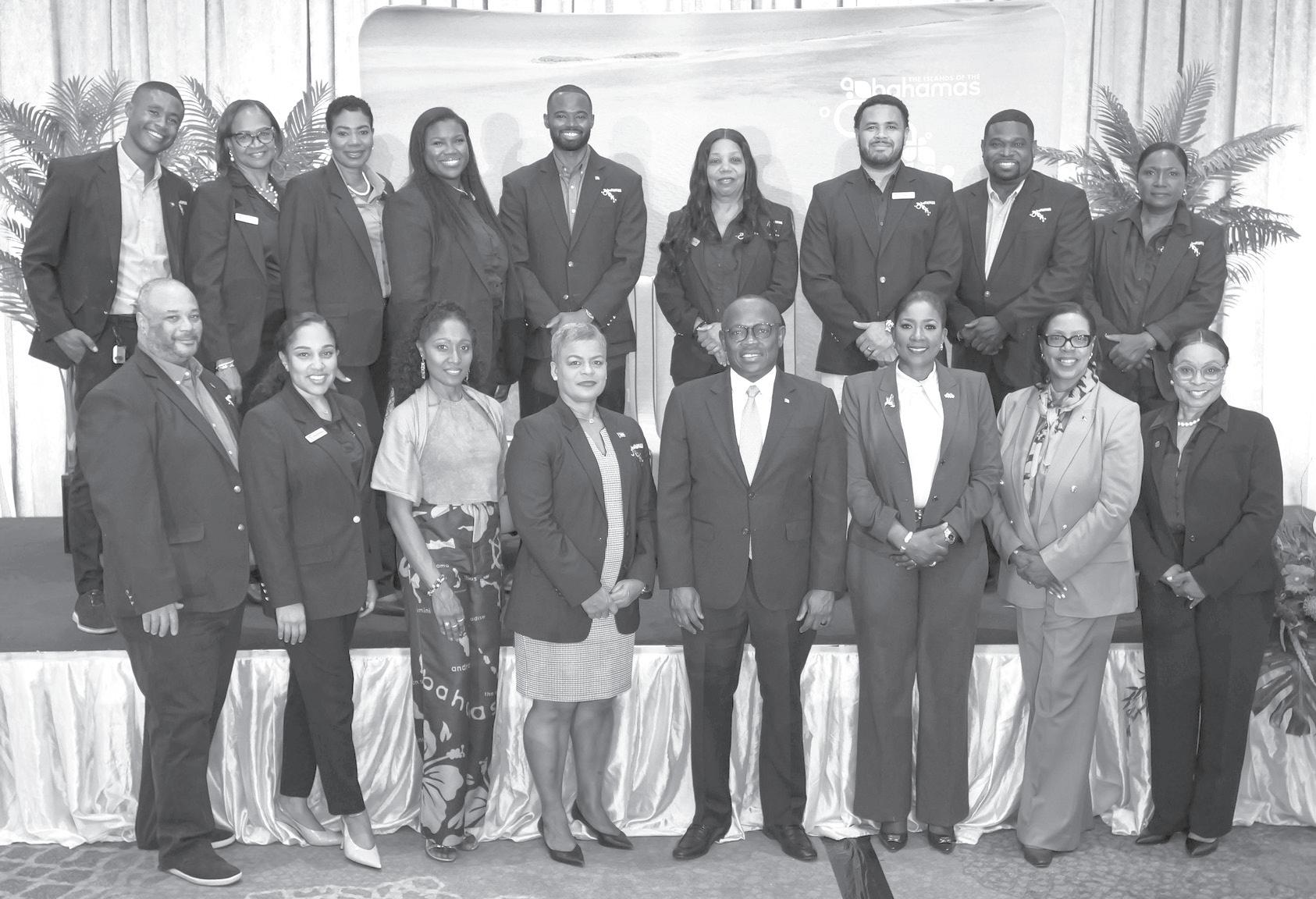

THE Bahamas promoted new airlift and increased destination access during a four-day sales and tourism promotion mission to Canada earlier this month.
The Ministry of Tourism, Investments and Aviation, in a statement, said its officials met with travel advisers, airline partners, tour operators and media in Ottawa, Halifax and Calgary between 6–9 October as they sought to highlight increased seat availability to The Bahamas.
Led by Chester Cooper, deputy prime Minister and minister of tourism, investments and aviation, and Latia Duncombe, the Ministry of Tourism’s director-general, the delegation staged trade shows, destination presentations and cultural showcases featuring Junkanoo performances. The events gave attendees a glimpse of The Bahamas’ family, wellness and adventure travel offerings.
Mr Cooper said: “Ottawa, Halifax and Calgary were chosen for this mission to highlight the new airlift and improved connectivity to The Bahamas. By meeting directly with travel partners and media in these cities, we are ensuring Canadians across the country are aware of the convenient, expanded access to our islands.”
Mrs Duncombe added:
“Canada has always been a priority for The Bahamas, and this mission was about strengthening partnerships and ensuring that new airlift converts into increased business for our islands.
“By engaging directly with travel advisors, tour operators and media, and giving them a taste of our vibrant culture, we are positioning The Bahamas as the top choice for Canadians this winter and beyond.”
The Ministry of Tourism, Investments and Aviation
has announced a major increase in airlift from Canada for the upcoming winter season, with a total of 45 weekly flights connecting that country’s major cities to The Bahamas. It said the expanded schedule reflects growing demand for Bahamian vacations, and strengthens year-round connectivity between the two countries.
For the peak winter travel period, from December 5, 2025, through April 10, 2026, Air Canada will launch new non-stop flights from Ottawa Macdonald–Cartier International Airport and Halifax Stanfield International Airport to Nassau’s Lynden Pindling International Airport (LPIA).
The carrier will also continue operating six to seven flights per week from Toronto Pearson International Airport to Nassau. Seasonal service from Montréal–Pierre Elliott Trudeau International Airport to Nassau will return for the summer period, June 20 through August 29, 2026, operating every Friday aboard the Airbus A220.
Meanwhile, Air Canada Vacations’ weekly service from Toronto Pearson International Airport to Exuma International Airport will also restart on November 2025 and continue through April 2026. Porter Airlines has also expanded its footprint in The Bahamas with the announcement of a new non-stop service from Montréal to Nassau beginning on February 3, 2026. This follows the carrier’s recently-launched routes from Toronto, Ottawa and John C. Hamilton International Airport, all offering direct access to Nassau. Sunwing Vacations has also deepened its commitment to The Bahamas, extending its Toronto to Grand Bahama

route to year-round weekly service. The airline will maintain its Montréal to Grand Bahama route with weekly Saturday flights throughout the year. With new routes, expanded schedules and enhanced service from multiple Canadian gateways, The Bahamas will offer more options for travellers seeking an easy winter escape. This mission showcased The Bahamas’ expanded connectivity, strengthened key partnerships, and sought to drive more Canadians to visit this nation over the winter.


Cable in talks to settle
URCA’s pay-TV fine
SETTLEMENT
from page one
further $905,102 has now also been paid to cover the period between the latter date and the two parties’ settlement.
“As of June 30, 2024, the company and Aliv were involved in formal disputes with the Department of Inland Revenue (DIR) regarding assessments issued by the DIR for unpaid taxes and fees totalling $2.313m,” Cable Bahamas’ audited 2025 financial statements confirmed.
“Aliv’s assessment, covering the period from April 1, 2017, to March 31, 2022, amounted to $1.595m and related to VAT and Business Licence fees on insurance proceeds, international inbound roaming charges and other items.
The company’s [Cable Bahamas] assessment, covering the period from January 1, 2018, to June 30, 2022, amounted to $718,830 and pertained to VAT on international inbound voice charges.
“The Group, with the assistance of legal counsel, had initiated formal
disputes against the Department of Inland Revenue and, to avoid potential penalties, had deposited the disputed amounts with the Department of Inland Revenue. These payments were made without waiving any rights in the ongoing disputes, and the group intended to vigorously contest the assessments,” Cable Bahamas added.
“However, as the matter progressed during the year, further legal evaluation and discussions with legal counsel indicated it is more likely than not that the dispute will be resolved in the Department of Inland Revenue’s favour. Considering this evolving context, the group made a strategic decision to settle the dispute and avoid further financial exposure.”
Cable Bahamas’ financial statements said that, as a result of the settlement, the deposit paid to the Department of Inland Revenue was “expensed” during its 2025 financial year and recorded under ‘government and regulatory fees’. As a result of forfeiting the $2.313m to the Bahamian
tax authority, these fees increased by more than $4.45m year-over-year to hit $19.197m.
The BISX-listed communications provider also disclosed that, beyond the $2.313m, it made a further $1.225m payment to cover any outstanding taxes owed over the same issue between the disputed periods and the settlement date.
“Furthermore, in connection with the settlement and to reflect ongoing compliance for periods subsequent to the assessments, additional amounts of $905,102 for Aliv and $320,206 for the company, relating to the period from the end of the respective assessment periods to the settlement date, were also expensed under government and regulatory fees during the current year,” the financials added.
Mr Butler, explaining that Cable Bahamas and Aliv are looking forward and not back, told Tribune Business yesterday of the settlement: “Nobody wants to fight with tax collectors. We’re glad to get that off our plate. The Government is a partner of ours, we’re
a Bahamian organisation and we want to pay our fair share of taxes so that the country has the roads and infrastructure it needs. “It made no sense. We’re really trying to be partners with the Government and be a good corporate partner paying our fair share of taxes. We’re glad to get that behind us.” Cable Bahamas’ year-end 2025 financials also disclosed that it is in talks with the Utilities Competition and Regulation Authority’s (URCA) ruling that it pay a fine over its pay-TV service’s non-compliance with quality standards in 2021.
URCA has demanded the BISX-listed communications provider pay a fine equal to 2.025 percent of its monthly recurring pay-TV charges for that year. “On November 21, 2022, URCA issued a final determination and order against the company with respect to certain matters relating to its compliance with quality of service standards in the provision of its pay television services during the period January to December 2021,” Cable Bahamas recorded in its financials.
“At June 30, 2025, and
2024, a provision has been recognised for what the group considers to be a probable future outflow and included under amounts payable to the government and statutory agencies. The parties are in negotiations to settle the matter.”
Mr Butler yesterday confirmed that the pay-TV issue with URCA was not settled yet, but added: “We are trying to be a friend to all regulators.”
URCA’s late 2022 decision stemmed from an investigation it launched more than a year earlier in July 2021.
This came “in response to numerous complaints from customers following Cable Bahamas’ price applications to restructure/repackage its pay television packages in October 2020 and January 2021 for residential and business customers respectively”. Recurring complaints of outages, error messages and pixelated channels were probed.
Elsewhere, Cable Bahamas said the licences permitting its susbidiary, Cable Freeport, to operate in The Bahamas’ second city have been renewed for a 15-year period through to 2039. However, its legal
battle with URCA over whether the latter, or the Grand Bahama Port Authority (GBPA), has regulatory authority for communications in Freeport continues.
“In prior years, URCA issued preliminary determinations outlining perceived breaches by the group relating to the non-payment of fees with respect to its operations in Grand Bahama. URCA asserts that the group is in breach of Parts IV and XVI of the Communications Act and, as such, has pursued regulatory measures against the group with the view to resolve this matter,” Cable Bahamas said.
“The group has maintained that, based on provisions of the Hawksbill Creek Agreement, URCA does not have a legal basis to licence its operations in Grand Bahama, and has commenced legal proceedings to defend this position.
“At June 30, 2025 and 2024, a provision has been recognised for what the group considers to be a probable future outflow and included under amounts payable to the Government and statutory agencies.”
KEEPING RECORDS CRUCIAL TO FUNDING
BANK from page three
have a separate bank account?’... If your business is already struggling, it’s not going to behoove you to come to the bank to get more money.
“If you haven’t been keeping records, you’re probably not getting it funded. If you don’t have the collateral... Fortunately, like I said, we can do 100 percent on solar which means you don’t have to come up with collateral, but your project needs to be structured in a way that we can collateralise the asset.,” she added.
“And that’s actually been our biggest issue with solar specifically, because the way solar systems are placed, it doesn’t allow us to fully collateralise the asset. And so that’s something that we continue to be working on.”
Ms Cargill added that financing is hard to come by and, although solar energy has become more accessible and costs have decreased, it is still a significant investment. Ms Cargill said the BDB does not see many bankable projects.
“When you’re talking about a $15,000, $16,000, $20,000, $30,000, $50,000 investment, this is where access to real capital comes in, and the reality i, capital is not as accessible as we need it to be,” she added.
“When we talk about equity investment, for example, and things like community level, micro grids, etc, investors often need to see something like a 10 to 14 percent return.
“And then we also, in the industry that I’m in, we see
a limited number of bankable projects. So people talk about, ‘we can do this, we can do that.’ But when it comes to actually coming to the bank with a project that we can invest in, we don’t actually see a lot of those. “And then MSMEs (micro, small and mediumsized businesses) frequently don’t have the collateral nor the credit history for us to make an energy investment for us to say, ‘Okay, we’re going to lend you what you need in order to invest in solar’.”
Ms Cargill said the BDB has a memorandum of understanding (MoU) with the Small Business Development Centre (SBDC). She added that the SBDC had a grant for energy auditing and is a good place for renewable energy proponents to start before approaching a funder.
“SBDC also provides a collateral guarantee, and they also make sure, to some degree, that you have a really strong business plan before you come to a funder. So we have an MoU with SBDC,” Ms Cargill said, “and I think we’re just looking to assign it right now, which means that if you go through SBDC, or you come to BDB and you need a guarantee, we basically work in sync with one another. They’re the preparer, we’re the funder...”
The BDB is “moving from a transitional lender to a development architect”, designing frameworks and joining policy and capital. It is building “financial architecture for blended finance”, combining grants, concessional loans,

guarantee and equity.
“Through the joint SDG (sustainable development goals) fund, we piloted a blended financing product that combines repayable finance with grant elements,” Ms Cargill said. “This ability to blend finance is crucial if we want to unlock financial leverage. We are existing in a time now when brands are drying up. I think we’re all aware of what’s happening abroad.
“Even though we’re still talking about climate resilience, etc, we’re seeing some major donors back away from this space. But through blending, we can actually create concessional financing that goes further. So with joint SDG, we turned a $150,000 grant into $1.5m in financing, which is really good for a pilot.
“We’re at stage two of our green climate accreditation process, which is going to allow direct access to the largest fund in the world. GCF provides grants, loans,
equity up to $250m so that is going to be tremendous,” she added.
“And so we have to commend the Government for supporting BDB through this process. We’re also redesigning our green lending products. As I mentioned, we already lend up 100 percent for electric vehicles and solar systems, and we’re building our capacity for PPP (publicprivate partnership) and SPV (special purpose vehicle) structures, for major infrastructure, housing, transport, seaports. We really want to finance economic transformation, and energy is a key part of that.
“We’re developing investment fund structures that will allow citizens and institutions to own shares in national development. And so that’s what I mean when I say we’re moving from lender to architect. We aren’t waiting for opportunities. We see these national needs, and we’re going to step in to fill them with finance and investment.”

COASTAL CONSTRUCTION, ENERGY
GUIDANCE UNVEILED
unless you enforce whatever is being done. Effort would be better spent on enforcement than creating new Codes.
“We’re not short of regulations; we’re short of enforcement. In The Bahamas, we’re not short of regulations. There’s a regulation for everything. Unless that changes and we have more enforcement of the regulations that exist that [reforms] are just a bunch of paper that have no value to anyone.”
Mr Sands added that the existing Building Code, last updated some 22 years ago in 2003, was “fine” and made provision for devastating storms up to Category four and five hurricane strength. “We don’t have a challenge with that,” he reiterated.
“The damage we had with Dorian is not because we didn’t have a strong Building Code. It was because nobody followed the Building Code. If the
Building Code was the issue every structure [on Abaco and Grand Bahama] would have been impacted. Not every structure was impacted.
“If you tell me the problem was the Building Code, explain why some structures were not on the ground. If they followed the Code, is it because others didn’t follow the Building Code? Until we have proper discussions about what went wrong we’ll always go on spending millions of dollars when we’re not getting any value for it.”
Updating the Bahamas Building Code is a key condition for this nation to access $160m in InterAmerican Development Bank (IDB) financing that is intended to ensure The Bahamas has the best disaster risk management regime and governance in the Caribbean.
An IDB report, though, identified “the heavy workload at the Ministry of Public Works” as being among the key risks to the success of the project and
its reform agenda because this threatens to delay the new Bahamas Building Code’s submission to Parliament for enactment into law. This is critical because the release of at least some of the $160m funding is tied to this happening.
Detailing the policy and reform commitments made by the Davis administration to secure this latest financing, the IDB document said that as part of the “risk reduction” focus these include “publication of an update of The Bahamas Building Code to avoid the increase of vulnerability of public and private infrastructure to natural hazards, in accordance with best international building practices”.
However, this was also identified as a potentially major obstacle to releasing the $160m financing. “ Setting out the “main risks”, the IDB warned that “the heavy workload at the Ministry of Public Works might delay the submission of the update of the National Building Code to
Parliament for enactment, thus delaying the operation’s disbursement.
“This risk was assessed as medium-to-low. To mitigate this risk, the Ministry of Finance will engage in May through July with the Ministry of Public Works to prioritise the approval process and submission to Parliament,” the IDB report added.
“The commitment by the Government of The Bahamas to allocate resources to public sectors such as the Ministry of Public Works and Family Island Affairs, in addition to the allocation of resources to the Disaster Prevention Fund provides incentives for the sectoral implementation of ex-ante disaster risk reduction activities such as to support the enforcement of the updated building code for The Bahamas and increased regulatory standards.
“Even though the results achieved under the current policy-based loan by 2025 put The Bahamas as a leader in the Caribbean region in terms of disaster
risk management governance, these should not be considered the final target. Building on the reforms supported through this operation, The Bahamas has the opportunity to further strengthen its disaster risk management governance and improve its iGOPP score over the medium-long term.”
Mr Sweeting, in a communication to the House of Assembly yesterday, acknowledged that the documents he tabled were part of accessing the IDB loan “which is focused on updating The Bahamas’ Building Code - the last substantial revision of which occurred in 2003”.
He added: “I should emphasise that the guidance notes seek to promote sound recommendations and best practices for consideration by both government entities and the private sector during the construction of public and private sector infrastructure.
“These documents address critical concerns,
including the impact of climate change and the importance of energy efficiency in contemporary construction practices.... In the near future, my ministry will disseminate excerpts from both documents through various communication mediums.
“This will allow the private sector the opportunity to incorporate these recommendations into their building design and construction processes, thereby enhancing infrastructure reliability and efficiency. I wish to reiterate that these guidance notes are intended to serve as industry standards and best practice, supporting ongoing efforts to improve national infrastructure throughout The Bahamas,” Mr Sweeting continued.
“On a related note, I will soon provide a list of actions currently being undertaken, along with associated timeframes, for updating The Bahamas Building Code to achieve alignment with regionally and internationally recognised standards.”
OPPOSITION CALLS FOR LOCAL INTERNET EXCHANGE POINT
BILL from page one
third parties, he added that the legislation also provides “future proofing for innovation” by seeking to “anticipate emerging technologies” such as artificial intelligence (AI), biometrics and cloud computing.
Mr Roye, telling this newspaper that such a framework is “critical” for digital-based businesses and The Bahamas’ long-standing ambitions to become a technology hub, said: “A couple
of things stick out to me. The first thing that sticks out is that data collectors and data processors, businesses that collect and process data like ourselves, will be required to register with the Data Protection Commissioner.
“All companies that collect data or process data for other companies must register. For data breach offences, you incur fines of up to $50,000 or three years in prison. Compliance is no longer optional; it’s mandatory across the board. This is in line with international
best practices.”
The Plato Alpha chief then added: “The second thing I noticed is that there are more expanded individual rights for citizens. The prior Act from 2003 does not give residents many rights on how their data is managed.
“Now, with this new modern Act, residents have stronger rights over the management of their data, having it corrected or erased if it is not needed. It kind of shifts the power dynamic for control of data.” Mr Roye added that
the Bill’s “technology forward framework” is also “critical” for companies such as his and any ambitions The Bahamas may have to attract overseas digital firms.
“The third thing I noticed is this new Bill anticipates emerging technologies,” he told Tribune Business. “Fintech (financial technology), digital assets, AI, biometrics, cloud computing. It’s pretty much future-proofing for innovation, which is critical for businesses like ourselves building Triblock,

which is an AI-powered tool in some instances.
“It’s the registration process, expanded rights for residents and a more technology-focused framework for The Bahamas. It’s more in line with international standards across the board. I’m glad we are shifting with the times, and being more in tune with global data protection policies.
“It means we have to do our part as a company processing and managing data with regard to securing it, and it definitely gives our residents more rights with their data and how it’s being managed.” Triblock is Plato Alpha’s human resources and payment management platform.
US actors and so on, and the US government. It’s safer to have it remain here in The Bahamas.”
Establishing a Bahamian Internet Exchange Point was among the suggestions made by a committee that was formed under the Minnis administration to examine what was required to transform Grand Bahama into a technology hub that could attract local and international investors. However, little to no progress appears to have been made in developing this project.





Kwasi Thompson, the Opposition’s finance spokesman, used yesterday’s House of Assembly debate to call for The Bahamas to establish its own Internet Exchange Point (IXP) as a means to lower cost, improve connectivity and enhance the security associated with local e-mail communications.
He argued this would be more secure than the present system where Bahamian-to-Bahamian e-mail communications are routed through the US before arriving at the intended recipient in this nation. “If we have our own Internet Exchange Point, e-mails would not go outside the country; they would go directly to Bahamians,” Mr Thompson argued.
“The Bahamas would benefit greatly from establishing its own Internet Exchange Point. URCA produced a document that envisioned creating a new Internet Exchange Point for The Bahamas. It would lower Internet costs, provide faster Internet connectivity and offer greater security by remaining here in The Bahamas.”
An Internet Exchange Point is a physical location through which Internet infrastructure companies, such as Internet Service Providers (ISPs), CDNs, web enterprises, communication service providers, cloud and SaaS providers connect to exchange Internet traffic.





Speaking subsequently to Tribune Business, Mr Thompson said: “We believe an Internet Exchange Point would reduce the cost. In other Caribbean jurisdictions that did this, the cost of providing Internet services also went down. We think this would be the best way of doing it for security reasons.
“We believe it would be safer if electronic communications remain in the country rather than go through the US, which means they are exposed to
“The last I heard about it was in 2020 when URCA had produced a document detailing what was needed to be done for this to happen,” Mr Thompson said. “This was in anticipation of us proceeding in that direction. We have heard nothing further from 2020, and still today the Government has not made any progress in terms of making this happen.”
Wayde Watson, the Ministry of Economic Affairs parliamentary secretary, and who headed the Government’s digital transformation unit prior to being elected to Parliament, moved “to allay the fears of the Bahamian people” in response to Mr Thompson’s presentation by asserting that “there’s no such thing as 100 percent data sovereignty”.
He reassured that the Government’s e-mail and electronic communications with Bahamians were fully secure, adding: “The data and systems that we use in government are encrypted in such a way that we have tools in place to ensure that data is properly secure. We’ve made sure our data is encrypted.”
Mr Watson also pointed out that “Rome is not built in a day” after Mr Thompson voiced misgivings over whether the Government will dedicate the financial and human resources to properly execute on, and implement, the Data Protection Bill once it is passed by the House of Assembly.
Citing the seeminglymeagre resources provided in the 2025-2026 Budget for implementation of the Independent Commission of Investigations and Ombudsman’s Office, the east Grand Bahama MP argued that the Data Protection Bill “must be more than just words on the table”.
Mr Watson replied: “We have a phased approach to implementation. I want him [Mr Thompson] to be cognisant that Rome was not built in a day, and we will do our best to implement this Data Protection Bill so that it remains on course and gets done.”
‘WITHHOLDING PUBLIC OFFICIAL’S PAY
IS NOT RECOGNISED PUNISHMENT’
New Providence with effect from February 1, 2022.
“Greatly distressed at this development, the claimant travelled to Nassau to speak with senior officials of the Department, outlining the hardship he would face in being redeployed,” Justice Klein said.
“He pointed out that since his transfer to Cat Island he had invested in, among other things, a family home and had decided to settle there. His overtures bought him a little time, but on March 11, 2022, he received a letter which indicated that he had been expected to report for duty at Princess Margaret Hospital (PMH) on March 7, 2022, and reprimanded him for returning to Cat Island ‘without approval’.
“It stated further that a failure to report to PMH on March 14, 2022, ‘will result in you being absent without leave and therefore without pay’,” Justice Klein added.
“He responded by letter the same day further protesting the transfer.
“Among other things, he stated that he had become integrated in the Cat Island community, owned a home there, his wife was stationed there, and apparently he had also been elected as a local government representative - deputy chairman for Arthur’s Town.
“Furthermore, he remonstrated that he did
not have any housing or a vehicle in Nassau, and added the caveat that if he were required to return to New Providence - if the Department did not relent - he would request lodging, transportation and ‘disturbance’ allowances. By letter dated March 30, 2022, the Department refused his request for any of the allowances sought.”
Mr Holmes “thereupon took the decision to remain in Cat Island and continue to report to his normal place of work. However, beginning on June 5, 2023, he was locked out from the Cat Island office by a colleague who reportedly indicated that she was acting on instructions”.
“The claimant initiated conciliation proceedings before the Labour Board to try to resolve the matter, but filed a [Supreme Court action] seeking urgent injunctive relief after the defendant continued to lock him out,” Justice Klein added.
Mr Holmes, in his legal action, asserted that the “coding” or withholding of his salary as a public officer was “unreasonable, unlawful, unfair, oppressive, arbitrary” and in breach of the industrial agreement between the Government and the BPSU, as well as general orders, the Public Service Commission regulations and “the principles of natural justice”. As a result, Mr Holmes
argued that the withholding of his salary was “null, void and of no effect”. The veteran civil servant argued that “the withholding of his salary was unlawful and caused him significant financial hardship, including the risk of losing his family home in Cat Island”.
He added that the Government had failed to comply with the requirement in the BPSU industrial agreement that public servants be given 15 days’ notice of interisland transfers, while also citing General Orders 604 as giving civil servants the right to accept or reject redeployments based on their “own interests”,
The Government, though, stuck to the position that the “coding” or withholding of Mr Holmes’ salary was “reasonably and lawfully” done because he was considered “absent from work unless he accepted the transfer to New Providence, and therefore he was not entitled to receive his salary”.
Justice Klein, in his ruling, stated: “The essential argument being made by the claimant is that the defendant has unilaterally, unlawfully and without due process withheld his salary, notwithstanding that he has not been terminated and had continued to report for work until prevented from doing so.”
To justify actions, the Government cited different sections in General
Orders and the Public Service Commission regulations that dealt with civil servants being absent from work without permission or taking unauthorised leave. However, Justice Klein found that none of these applied to Mr Holmes’ circumstances.
“It is clear that he is not caught by the prescription of [the regulations] as he continued to report to his Cat Island station and did reply to the charge of being absent without leave. In any event, he was not dismissed,” the judge wrote.
“There is, however, no power under the regulations - and the defendant has drawn no other authority to the attention of the court - that permits the withholding of the entirety of a public officer’s salary who continues in employment and against whom no disciplinary proceedings are taken.
“To the extent that it is suggested in the Handbook that the permission of the permanent secretary can be sought to ‘code’ a public officer’s salary other than the procedure relating to interdiction, this is clearly ultra vires the regulations and unlawful,” Justice Klein added.
“This is not the place to consider the legal status of the Handbook, but the law is crystal clear that policy documents, even if they form part of a contract - and there was no argument on whether
the Handbook formed a part of the claimant’s contract - cannot override statutory provisions.”
Justice Klein said that “withholding a public officer’s salary is not even a recognised form of punishment”, and added: “In reality, this is not even a case of being absent without leave, nor about claiming pay for work not done. This is a case where the employer always knew where the employee was.
“Admittedly, he was protesting his redeployment whether rightly or wrongly, but was willing to work and reported to work at the station at which he was last assigned to work until he was locked out. In fact, it is a point of some significance that the claimant was not locked out until June 5, 2023, which means that he in fact worked for roughly over a year even after his salary was stopped.
“He had worked for much of the period and had always indicated an intention and willingness to work. If the Department were of the opinion that the claimant’s action constituted a breach of the terms of his employment that merited disciplinary action - even serious disciplinary action - they were free to take such action in this regard,” the judge added.
“But they had no statutory, contractual, or common law authority to simply withhold all of his pay while affirming his
employment and contract with the Department in the absence of any disciplinary proceedings.”
As for restoring Mr Holmes’ withheld salary, Justice Klein said of the Government’s opposition: “The Defendant submits that the grant would require them to unlawfully ‘deplete’ their resources (i.e, require payments from the Public Treasury), but I am not at all persuaded by that submission.
“As discussed, the defendant has not taken any disciplinary action against the claimant that could possibly result in his dismissal (or at all.. Furthermore, the defendant cannot be heard to complain about payments without lawful justification when in fact the claimant worked for over a year without pay, and was only prevented from continuing to work by the defendant’s actions.
“The defendant, represented by the Attorney General, is a government department. It holds vastly superior bargaining power as well as the statutory authority to take whatever course of action it deemed (or deems) necessary by way of disciplinary action to ensure compliance with any operational instructions and an employee’s terms of employment. But it cannot bypass those statutory alternatives in favour of undisguised economic coercion.”
CHINESE AIRLINES PROTEST US PLAN TO BAN THEIR FLIGHTS OVER RUSSIAN AIRSPACE
By CHAN HO-HIM AP Business Writer
CHINA’S biggest stateowned air carriers have hit back at a US proposal to bar them from flying over Russia when traveling to or from the US.
The US side has said such flights give Chinese airlines an unfair cost advantage over American carriers, which cannot cross through Russian airspace.
Moscow closed Russian airspace to US air carriers and most European airlines in 2022 in response to Western sanctions for Russia’s invasion of Ukraine.
Air China, China Eastern and China Southern are among six Chinese airlines filing complaints over the order proposed last week to
prohibit such flights by Chinese carriers.
China Eastern said in its filing this week to the US Department of Transport that the proposed ban would “harm the public interest” and “inconvenience travellers” from both China and the US. The additional flight time would result in higher costs and elevated air fares, which increases the burden on all travellers, it said.
China Southern warned that a Russian airspace ban would adversely affect thousands of travelers.
Air China said it estimates at least 4,400 passengers would be affected if the ban takes effect during the Thanksgiving and Christmas season.
Last week, China’s foreign ministry spokesperson
NOTICE

NOTICE is hereby given that JENNIE ESTORCIEN of Hay Street off, East Street, is applying to the Minister responsible for Nationality and Citizenship, for Registration/ Naturalization as a citizen of The Bahamas, and that any person who knows any reason why registration/naturalization should not be granted, should send a written and signed statement of the facts within twenty-eight days from the 16th day of October 2025 to the Minister responsible for nationality and Citizenship, P.O. Box N-7147, Nassau, New Providence, The Bahamas.
NOTICE

NOTICE is hereby given that JACQUELINE JOSEPH Marsh Harbour, Abaco, The Bahamas, is applying to the Minister responsible for Nationality and Citizenship, for Registration/ Naturalization as a citizen of The Bahamas, and that any person who knows any reason why registration/naturalization should not be granted, should send a written and signed statement of the facts within twenty-eight days from the 16th day of October 2025 to the Minister responsible for nationality and Citizenship, P.O. Box N-7147, Nassau, New Providence, The Bahamas.
Guo Jiakun also hit back at the proposed ban, saying the move would be “punishing” passengers around the world.
David Yu, an aviation industry expert at New York University Shanghai, said that US carriers’ inability to fly over Russian airspace has increased flight paths for some US-China routes by roughly two to three hours. Longer journeys require more fuel and pressure US carriers’ profitability.
“The US-China route historically has been a money-maker for airlines on both sides,” Yu said.
“From the Chinese carriers’ perspective, if you can go through Russia, your costs go down.” Despite that, Chinese
carriers have struggled with losses, especially since the COVID-19 pandemic.
The US Department of Transportation said in its proposed order that Chinese carriers’ ability to cross Russian airspace has caused “competitive imbalances” between American and Chinese airlines.
“Being able to use the most efficient route provides a competitive advantage because it usually results in the shortest flight time duration, thereby offering a more appealing option to travellers,” the department said last week.
The US Department of Transportation said it would consider public comments before finalising the plan.
NOTICE

NOTICE is hereby given that ENNE H H A of Carmichael Road, Nassau, The Bahamas is applying to the Minister responsible for Nationality and Citizenship, for Registration/Naturalization as a citizen of The Bahamas, and that any person who knows any reason why registration/naturalization should not be granted, should send a written and signed statement of the facts within twenty-eight days from the 9th day of October 2025 to the Minister responsible for nationality and Citizenship, P.O. Box N-7147, Nassau, New Providence, Bahamas.
NOTICE

NOTICE is hereby given that LYNO ABRAHAM of Lightbourne Avenue, Nassau, The Bahamas, is applying to the Minister responsible for Nationality and Citizenship, for Registration/ Naturalization as a citizen of The Bahamas, and that any person who knows any reason why registration/ naturalization should not be granted, should send a written and signed statement of the facts within twenty-eight days from the 16th day of October 2025 to the Minister responsible for nationality and Citizenship, P.O. Box N-7147, Nassau, New Providence, The Bahamas.
European airlines including Air France-KLM have also complained.
In a filing to the Department of Transportation, United Airlines
urged
subject to the ban.
NOTICE

NOTICE is hereby given that ILNIC IMA of George Town Exuma, The Bahamas is applying to the Minister responsible for Nationality and Citizenship, for Registration/Naturalization as a citizen of The Bahamas, and that any person who knows any reason why registration/naturalization should not be granted, should send a written and signed statement of the facts within twenty-eight days from the 9th day of October 2025 to the Minister responsible for nationality and Citizenship, P.O. Box N-7147, Nassau, New Providence, Bahamas.
NOTICE

NOTICE is hereby given that SHANICA MELICE of Pinedale, Nassau, The Bahamas is applying to the Minister responsible for Nationality and Citizenship, for Registration/Naturalization as a citizen of The Bahamas, and that any person who knows any reason why shouldregistration/naturalization not be granted, should send a written and signed statement of the facts within twenty-eight days from the 9th day of October 2025 to the Minister responsible for nationality and Citizenship, P.O. Box N-7147, Nassau, New Providence, Bahamas.
NOTICE

NOTICE is hereby given that ANNMARIE
of Colony Village, Prince Charles, Nassau, The Bahamas is applying to the Minister responsible for Nationality and Citizenship, for Registration/ Naturalization as a citizen of The Bahamas, and that any person who knows any reason why registration/naturalization should not be granted, should send a written and signed statement of the facts within twenty-eight days from the 16th day of October 2025 to the Minister responsible for nationality and Citizenship, P.O. Box N-7147, Nassau, New Providence, The Bahamas.
Bahamas targets affordable housing financing solutions
By ANNELIA NIXON Tribune Business Reporter anixon@tribunemedia.net
A CABINET minister yesterday said the Government is seeking to offer incentives that will encourage sustainable and resilient construction.
Zane Lightbourne, minister of state for the environment, told a renewable energy conference staged by the Bahamas Chamber of Commerce and Employers Confederation (BCCEC) that the Ministry of Works and the Inter-American Development Bank (IDB) are working to change the way buildings are constructed in The Bahamas.
Promising that these policies will also consider energy security, he added: “There are few partnership incentives that we have embarked on, and we’re still looking to uptick that basic policy within our government to incentivise
more private sector persons to embark on sustainable renewable energy.
“And, presently, the Ministry of Works is looking further, along with the IDB, to improve the way that we build, in terms of sustainability, our resilience. It’s a very thin line, because the cost of building more sustainably, it usually falls on the contractor, and therefore the cost of the person wanting to build a home.
“So we’re looking at what’s recommended in terms of how we should build and how we could build. We’ve been considering the fact that hurricanes are looking different. Frequency of hurricanes in our region and where we live, coupled with our salt air, and us being near the coast, we have to look at all factors including the fact that hurricanes now come with more flooding sometimes than wind,” Mr Lightbourne added.
“And so we have to look
at building up, and we want to make sure that whatever framework that we put in place, that we also present incentives for persons to embark on building not only to the new codes that may be proposed, but also at looking at more innovative ways of how we build, how we secure our energy, and how we decrease the cost of natural disasters to our economy.”
Mr Lightbourne said the Government is also working to ensure “big fossil fuel giants” take responsibility and pay for damages caused due to climate change. “And we’re also embarking on causing, in simpler terms, the big fossil fuel giants to take some responsibility to actually pay for some of the damages that’s inflicted on us through climate change, because comparatively, we are very small when it comes to producing fossil fuels and carbon,” he added.
“And so we are working on financial incentives, on
subsidies, and introducing grants and loans to the private sector and businesses so that they could reduce the initial investment hesitation if they have any.”
Sumayyah Cargill, acting manager director at the Bahamas Development Bank, spoke to the Green Climate Fund (GCF). “A lot of these major polluters... they may not give you money directly, but they put it into what we call vertical climate funds, like the GCF,” she said. “And then we access that funding through institutional mechanisms.
“So if you look at the money that is coming into The Bahamas relative to the money that is coming into other Caribbean countries... for example, the OCS, the Organisation of Caribbean States from Jamaica to Barbados, The Bahamas is actually falling far behind compared to our peers, and that is because we don’t
necessarily use our institutional mechanisms the way that these other countries are using them.
“So what BDB is attempting to do is to strengthen its institutional mechanism to access these vertical funds for climate adaptation and mitigation, which includes renewable energy, but it also includes those solutions.” Ms Cargill added that the BDB hopes to be accredited this year and, once this happens, it will be able to access up to $250m per project.
“So, as the minister mentioned, there is a cost to renewable energy,” Ms Cargill said. “There’s a cost to flood resistance. There is a cost to strengthening our physical infrastructure against these storms. We then, as a country, as businesses, as individuals, will then be able to say to GCF, ‘we are a small island developing state. Don’t just give us a loan, which will be great... but give us a grant,
for example, to cover some of these costs’.
“So as our first contribution to the national country pipeline, in partnership with the Office of the Prime Minister, we’ve actually put forward a model of affordable housing because that is one of the biggest challenges that we see right now in this country. So, how do we then solve affordable housing using GCF resources?
“First of all, we ask for a grant to cover the cost of that environmental hardening, cover the cost of lifting these houses, etc, then cover the cost for the individuals who also have to come in and buy those houses. Just give us a straightforward grant to cover these down payments. That’s the kind of thing that we will be able to do once this accreditation happens, and we think that is going to enact the Government’s mandate of real change that you can see, touch and feel.”
GOVERNMENT SHUTDOWN PUTTING A RENEWED SPOTLIGHT ON CRACKS IN US AVIATION SYSTEM
By RIO YAMAT AP Airlines and Travel Reporter
A STARTLING message came over the radio from an air traffic control tower near Los Angeles less than a week into the federal government shutdown: “The tower is closed due to staffing.” Without enough air traffic controllers to guide planes into and out of Hollywood Burbank Airport, the tower went dark for almost six hours on Oct. 6,
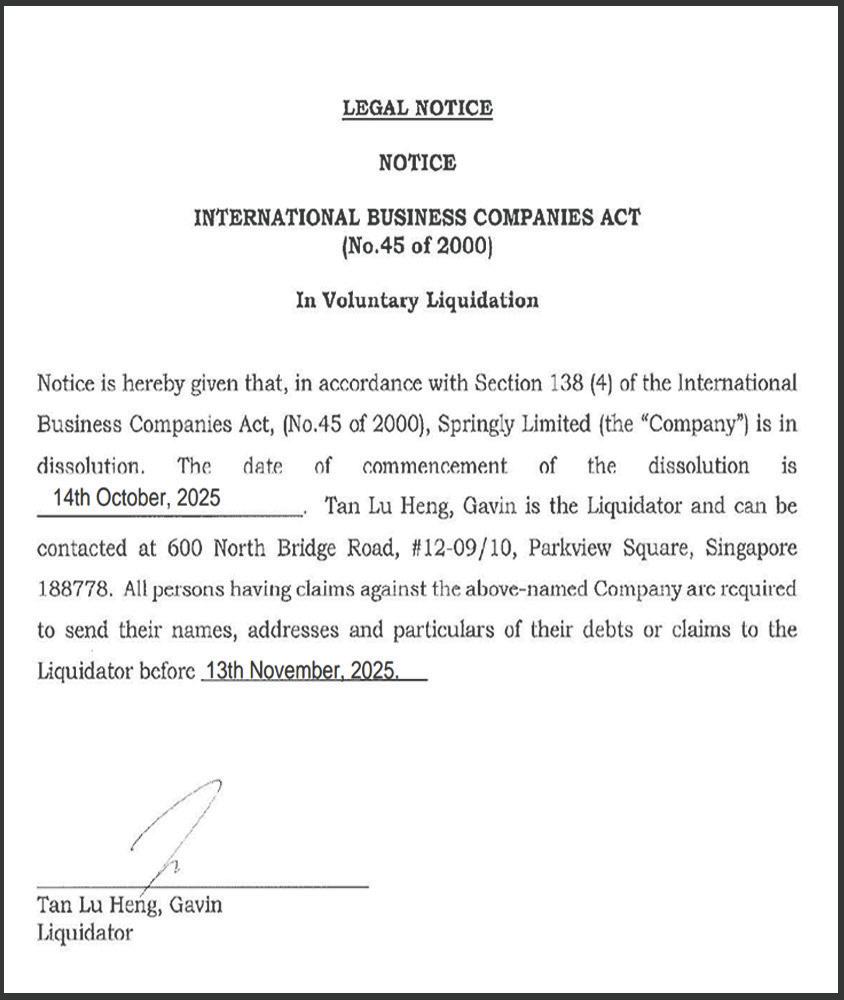
NOTICE
RPESSOA INVESTIMENTOS LTD.
Incorporated under the International Business Companies Act, 2000 of the Commonwealth of The Bahamas. Registration number 210288 B (In Voluntary Liquidation)
Notice is hereby given that the above-named Company is in dissolution, commencing on the 14th day of October A.D. 2025.
Articles of Dissolution have been duly registered by the Registrar. The Liquidator is Mr. Rafael Marques Ribeiro Pessoa, whose address is SHIN QI 14 CJ 09 LT 18 Lago Norte, DF, CEP: 71530-000 Brazil. Any Persons having a Claim against the above-named Company are required on or before the 13th day of November A.D. 2025 to send their names, addresses and particulars of their debts or claims to the Liquidator of the Company, or in default thereof they may be e cluded from the beneft of anydistribution made before such claim is proved.
Dated this 14th day of October A.D. 2025. RAFAEL MARQUES RIBEIRO PESSOA LIQUIDATOR
NOTICE POWERDO LTD.
Incorporated under the International Business Companies Act, 2000 of the Commonwealth of The Bahamas. Registration number 205854 B (In Voluntary Liquidation) Notice is hereby given that the above-named Company is in dissolution, commencing on the 14th day of October A.D. 2025.
Articles of Dissolution have been duly registered by the Registrar. The Liquidator is Mr. Washington Javier Botella Fachola, whose address is Av. Victor Civita, 235 Casa 237, CEP: 06544-072, Santana de Parnaiba, Sao Paulo, Brazil. Any Persons having a Claim against the abovenamed Company are required on or before the 13th day of November A.D. 2025 to send their names, addresses and particulars of their debts or claims to the Liquidator of the Company, or in default thereof they may be excluded from the beneft of any distribution made before such claim is proved.
Dated this 14th day of October A.D. 2025. WASHINGTON JAVIER BOTELLA FACHOLA LIQUIDATOR
leaving pilots to coordinate their movements among themselves. Flight delays averaged two-and-a-half hours in one of the first visible signs that the shutdown was already taking a toll on the nation’s aviation system.
Since the shutdown began October 1, the Federal Aviation Administration has reported controller shortages in cities across the US, from airports in Boston and Philadelphia, to control centers in Atlanta and Houston. Flight delays have spread to airports in Nashville, Dallas, Newark and more. And already there has been an increase in unscheduled absences among security screeners at some airports. The union representing Transportation Security Administration employees says the absences haven’t yet caused major disruptions, but it warned longer lines at security checkpoints
could soon become a reality after workers received their final paychecks over the weekend.
Experts and union leaders say the disruptions are a stark reminder that the aviation system is already stretched too thin by chronic understaffing and outdated technology. They warn the cracks in the system could rapidly deepen the longer the shutdown drags on and critical aviation workers are without their regular paychecks.
“It’s like having a drought the year after you had a drought,” Greg Raiff, CEO of Elevate Aviation Group, told The Associated Press.
These concerns aren’t new. In 2019, the aviation system buckled under the weight of a 35-day government shutdown — the longest in US history — during President Donald Trump’s first term.
Around the three-week mark, air traffic controllers,
many of them working up to 60 hours a week, sued the government over their missed paychecks. One terminal at the Miami International Airport was forced to close because security screeners were calling out sick in large numbers. Some even quit altogether.
“Here we are so many years later, and the problems have not been addressed,” said aviation attorney Ricardo MartinezCid, a Florida Bar-certified expert on aviation law who regularly represents crash victims. “Now we’re in a worse position when we had been put on notice. We had the opportunity to address it.”
Since then, the country has faced repeated warnings. In January, a mid-air crash over the Potomac River involving a commercial jet and a military helicopter killed 67 people.
A series of equipment failures and radar outages this
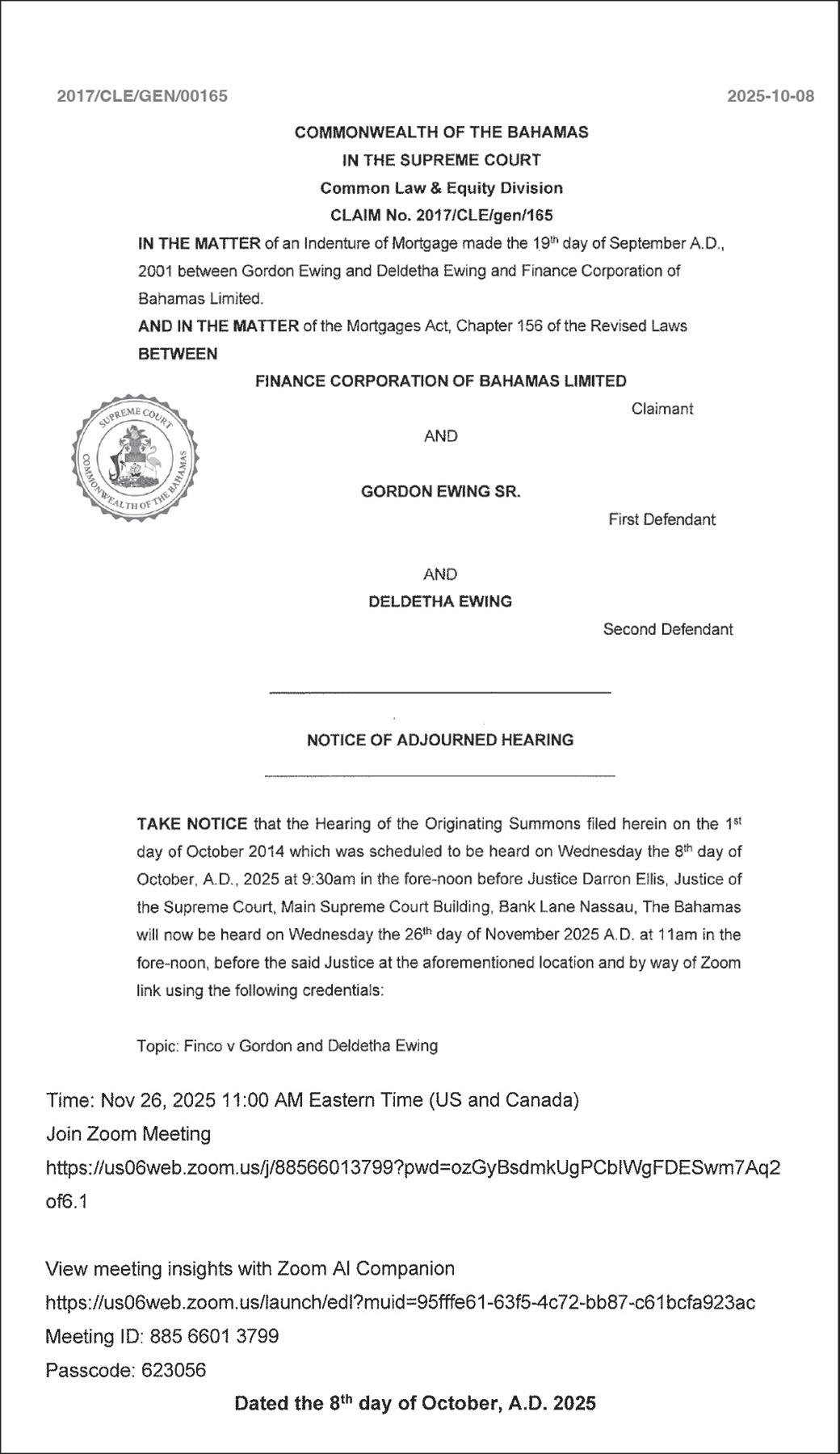
year also highlighted the need for upgrades. Before the latest shutdown, both the FAA and TSA were already dealing with staffing shortages. That includes a shortage of about 3,000 air traffic controllers.
Nick Daniels, president of the National Air Traffic Controllers Association, has said staffing levels have reached a “critical” point, the lowest in decades. The shortage is so severe that even a few air traffic controllers missing work can disrupt operations at already understaffed facilities.
“And on top of that,” he said, “they’re working with unreliable equipment.”
The shutdown began just as the FAA was starting to make some progress on addressing the shortage of controllers and modernizing the outdated equipment they rely on that keeps disrupting flights when it malfunctions.
The agency says it topped its goal of hiring 2,000 controllers this year after streamlining the application process at its academy in Oklahoma City, but it will take years still to eliminate the shortage. And it had just begun looking for companies to help oversee a $12.5 billion effort to overhaul its aging and complex technology systems.
Now, the shutdown is delaying those long-needed efforts. And union leaders say the staffing shortages may be worse by the time the government reopens.
Johnny Jones, secretarytreasurer of the American Federation of Government Employees chapter representing TSA workers, expressed concern that the shutdown could drive even more security screeners to leave the agency, especially given the uncertainty that the workers already have faced this year. That includes the Trump administration’s attempts to revoke their collective bargaining rights.
Daniels, meanwhile, warned it could stoke fear among newer controllers and trainees who might reconsider the career entirely to avoid working in future shutdowns.
It’s a long-standing concern. In 2019, after the 35-day shutdown ended, a congressional committee hearing dug into the impacts on air travel.
“All of these air traffic controllers and aviation safety professionals were used as pawns in a political fight that had nothing to do with aviation. This is wrong and must not be allowed to happen again,” warned the union leader representing air traffic controllers at the time. At the hearing, there were also bipartisan calls for reform to keep the FAA funded “without interruption, even when the rest of the government shuts down,” as one lawmaker put it.
TRUMP OFFICIALS BACK FIRM IN FIGHT OVER CALIFORNIA OFFSHORE
OIL DRILLING AFTER HUGE SPILL
By JULIE WATSON Associated Press
WHEN the corroded pipeline burst in 2015, inky crude spread along the Southern California coast, becoming the state’s worst oil spill in decades.
More than 140,000 gallons (3,300 barrels) of oil gushed out, blackening beaches for 150 miles (240 kilometers) from Santa Barbara to Los Angeles, polluting a biologically rich habitat for endangered whales and sea turtles, killing scores of pelicans, seals and dolphins, and decimating the fishing industry.
Plains All American Pipeline in 2022 agreed to a $230 million settlement with fishers and coastal property owners without admitting liability. Federal inspectors found that the Houstonbased company failed to quickly detect the rupture and responded too slowly. It faced an uphill battle to build a new pipeline.
Three decades-old drilling platforms were subsequently shuttered, but another Texas-based fossil fuel company supported by the Trump administration purchased the operation and is intent on pumping oil through the pipeline again.
Sable Offshore Corp., headquartered in Houston, is facing a slew of legal challenges but is determined to restart production, even if that means confining it to federal waters, where state regulators have virtually no say. California controls the 3 miles (5 kilometers) nearest to shore. The platforms are 5 to 9 miles (8 to 14 kilometers) offshore.
The Trump administration has hailed Sable’s plans as the kind of project the president wants to increase US energy production as the federal government removes regulatory barriers. President Donald Trump has directed Interior Secretary Doug Burgum to undo his predecessor’s ban on future offshore oil drilling on the East and West coasts.
“This project risks another environmental disaster in California at a time when demand for oil is going down and the climate crisis is escalating,” said Alex Katz, executive director of Environmental Defense Center, the Santa Barbara group formed in response to a massive spill in 1969.
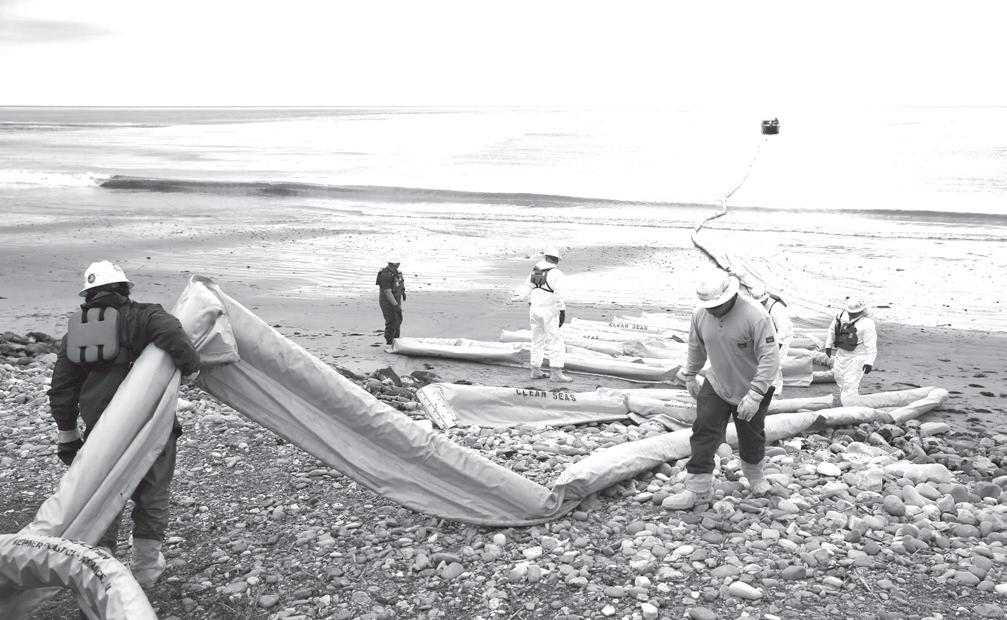
The environmental organisation is among several suing Sable.
“Our concern is that there is no way to make this pipeline safe and that this company has proven that it cannot be trusted to operate safely, responsibly or even legally,” he said.
Actor and activist Julia Louis-Dreyfus, who lives in the area, has implored officials to stop Sable, saying at a March protest: “I can smell a rat. And this project is a rat.”
The California Coastal Commission fined Sable a record $18 million for ignoring cease-and-desist orders over repair work it says was done without permits. Sable said it has permits from the previous owner, Exxon Mobil, and sued the commission while work continued on the pipeline. In June, a state judge ordered it to stop while the case proceeds through the court. The commission and Sable are due back in court Wednesday.
“This fly-by-night oil company has repeatedly abused the public’s trust, racking up millions of dollars in fines and causing environmental damage along the treasured Gaviota Coast,” a state park south of Santa Barbara, said Joshua Smith, the commission’s spokesman. So far, Sable is undeterred.
The California Attorney General’s office sued Sable this month, saying it illegally discharged waste into waterways, and disregarded state law requiring permits before work along the pipeline route that crosses sensitive wildlife habitat.
“Sable placed profits over environmental protection in its rush to get oil on the market,” the agency said in its lawsuit.
Last month, the Santa Barbara District Attorney filed felony criminal charges against Sable, also accusing it of polluting waterways and harming wildlife.
Sable said it has fully cooperated with local and state agencies, including the California Department of Fish and Wildlife, and called the district attorney’s allegation “inflammatory and extremely misleading.” It said a biologist and state fire marshal officials oversaw the work, and no wildlife was harmed.
The company is seeking $347 million for the delays, and says if the state blocks it from restarting the onshore pipeline system, it will use a floating facility that would keep its entire operation in federal waters and use tankers to transport the oil to markets outside California. In a filing with the US Securities and Exchange Commission on Thursday, the company updated its plan to include the option.
The US Interior Department’s Bureau of Safety and Environmental Enforcement said in July it was working with Sable to bring a second rig online.
“President Trump made it clear that American energy should come from American resources,” the agency’s deputy director Kenny Stevens said in a statement then, heralding the “comeback story for Pacific production.”
The agency said there are an estimated 190 million barrels (6 billion gallons) of recoverable oil reserves in the area, nearly 80% of residual Pacific reserves. It noted advancements in preventing and preparing for oil spills and said the failed pipeline has been rigorously tested.
“Continuous monitoring and improved technology

significantly reduce the risk of a similar incident occurring in the future,” the agency said.
On May 19 — the 10th anniversary of the disaster — CEO Jim Flores announced that Sable “is proud to have safely and responsibly achieved first production at the Santa Ynez Unit” — which includes three rigs in federal waters, offshore and onshore pipelines, and the Las Flores Canyon Processing Facility.
State officials countered that the company had only conducted testing and not commercial production. Sable’s stock price dropped
and some investors sued, alleging they were misled.
Sable purchased the Santa Ynez Unit from Exxon Mobil in 2024 for nearly $650 million primarily with a loan from Exxon. Exxon sold the shuttered operation after losing a court battle in 2023 to truck the crude through central California while the pipeline system was rebuilt or repaired.
Flores said well tests at the Platform Harmony rig indicate there is much oil to be extracted and that it will relieve California’s gas prices — among the nation’s highest — by stabilizing supplies.
“Sable is very concerned about the crumbling energy complex in California,” Flores said in a statement to The Associated Press. “With the exit of two refineries last year and more shuttering soon, California’s economy cannot survive without the strong energy infrastructure it enjoyed for the last 150 years.” California has been reducing the state’s production of fossil fuels in favor of clean energy for years. The movement has been spearheaded partly by Santa Barbara County, where elected officials voted in May to begin taking steps to phase out onshore oil and gas operations.



Urban Renewal and Sister Sister hit the streets for cancer awareness
HUNDREDS of morning commuters along JFK Drive were met with a flurry of pink and a message of hope as Sister Sister joined forces with the Ministry of Housing and Urban Renewal for Breast Cancer Awareness Month.
With pink ribbons, shirts, and good cheer, from 7-10am volunteers handed out hot breakfasts and fruit bags full of healthy snacks and materials promoting early detection as critical in the fight against breast cancer. Each bag included bottled water, fruit, a granola bar, breast cancer pins, and information on where to find help and screening services.
The event, coordinated by
Keith Bell, Minister of Housing and Urban Renewal, and Lisa Rahming, Minister of State, brought together Urban Renewal officers and community partners.
Senior Commissioner Stephen Dean of the Royal Bahamas Police Force invited Sister Sister to take part in the effort, recognising their work in providing assistance to women and families affected by breast cancer. From food assistance, to counseling, and the ports needed to administer chemotherapy, for 25 years Sister Sister has been a critical link for women diagnosed with the disease. For them the message is clear - diagnosis isn’t a death sentence. Through education on
self-examination, timely mammograms, and knowing when to seek medical advice and assistance, Sister Sister aims to lower both the rate of diagnosis and the number of women lost to the disease.
Urban Renewal and the Department of Housing unveiled a Memory Wall as part of the morning’s event. Featuring an open-frame butterfly, ministers and department heads pinned ribbons on the wings in remembrance of those who lost their battle. Members of the public will continue to add ribbons throughout October.
For more information, to volunteer, or to donate, visit www.sistersisterbahamas.

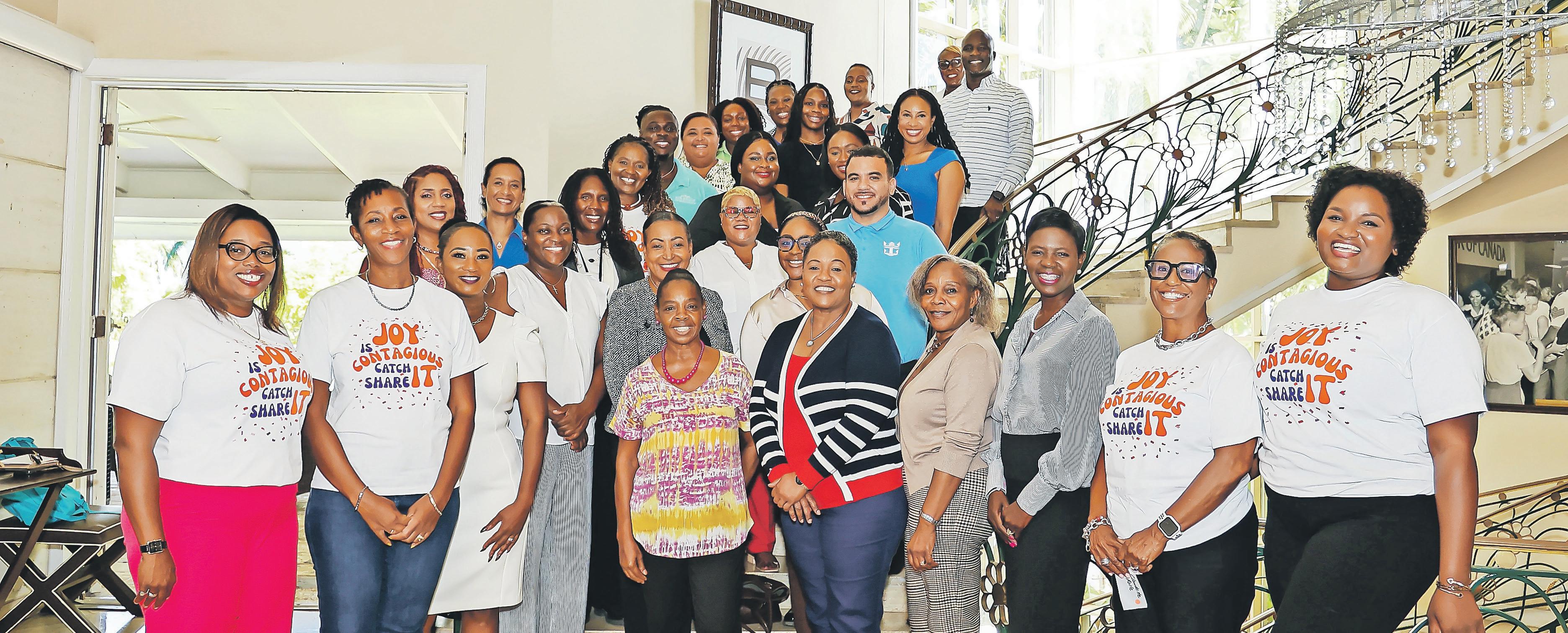
TEN YEARS OF CHARACTER DAY
CHARACTER Day
marks its tenth anniversary this year - with the theme “Joy is contagious - catch it, share it”.
The day was launched in 2015 by the PACE Foundation, which supports a programme for teen mothers.
Since then, it has empowered thousands of teachers, students, and employers, shaping a movement dedicated to nation-building.
Foundation president Claudette Rolle said: “Our objective is to nurture children who embody love and fairness. We are committed to ensuring that new mothers instill these vital values in their children.”
She also thanked the Templeton Foundation, noting, “Without their vital support, this programme simply would not exist.”
Over the years, Character
Day has expanded into schools nationwide, and four years ago, corporate Bahamas joined the movement.
This year’s activities included educators’ workshops in New Providence, Grand Bahama, and online for Family Island participants. A lively corporate luncheon workshop was also held at the Balmoral Club on October 1, with over 40 attendees.
Officially recognised on October 15, Character Day invites individuals, schools, businesses, and non-profits to host events promoting character development. The Hidden Heroes initiative spotlights unsung community members who exemplify outstanding character.
Kaylisa Kemp, the Family Islands representative for Grand Bahama, Bimini,

and the Berry Islands, reflected on the impact: “When we launched a decade ago, introducing character education was a challenge. But over the years, it has transformed students and colleagues alike. Many proudly wear their Character Day shirts and remember the lessons and songs they’ve learned.”
A teacher at St Thomas More School shared her

first workshop experience: “It was extraordinary! I learned so many creative ways to strengthen my students’ character — and my own. Simple actions like praying for others and sharing compliments can make a huge difference.”
At the Corporate Character Day (CCD) HR Professionals’ Luncheon session, titled “Called to Joy: Shaping Emotional
Culture as an HR Professional,” Verneca Ferguson, HR director at Dolphin Encounters, said: “Joy and resilience are essential to building strong teams. Small acts — recognition, gratitude, and genuine connection — create workplaces where people feel safe, valued, and motivated to give their best.”
The luncheon also featured Karen McCartney,
founder of Lord & George Consulting, who discussed how joy strengthens workplace trust and productivity. To support educators, Character Day Bahamas has introduced a new digital instructional resource available at www.characterdaybahamas.org. The site also provides downloadable resources and recordings from past Character Day events up to 2025.

ANGOSTURA SHINES AT PARADISE PLATES
CARIBBEAN Wines & Spirits (CWS), The Bahamas’ premier wines and spirits distributor welcomed guests at Paradise Plates with The House of Angostura.
The House of Angostura’s premium rum and bitters were available for attendees.
The Spiced Desire cocktail, crafted with Tamboo, featured a blend of all three Angostura bitters (Aromatic, Orange, and Cocoa)
while the Bananza mocktail offered a mix of banana purée and cocoa bitters. Desserts infused with Bitters were showcased. Citrus Kiss cake pops, made with orange bitters, and the Velvet Coco brownies, featuring cocoa bitters, were also available to taste.
For more updates on Caribbean Wines & Spirits’ new products, events and promotions, visit www.cwsbahamas.com today.


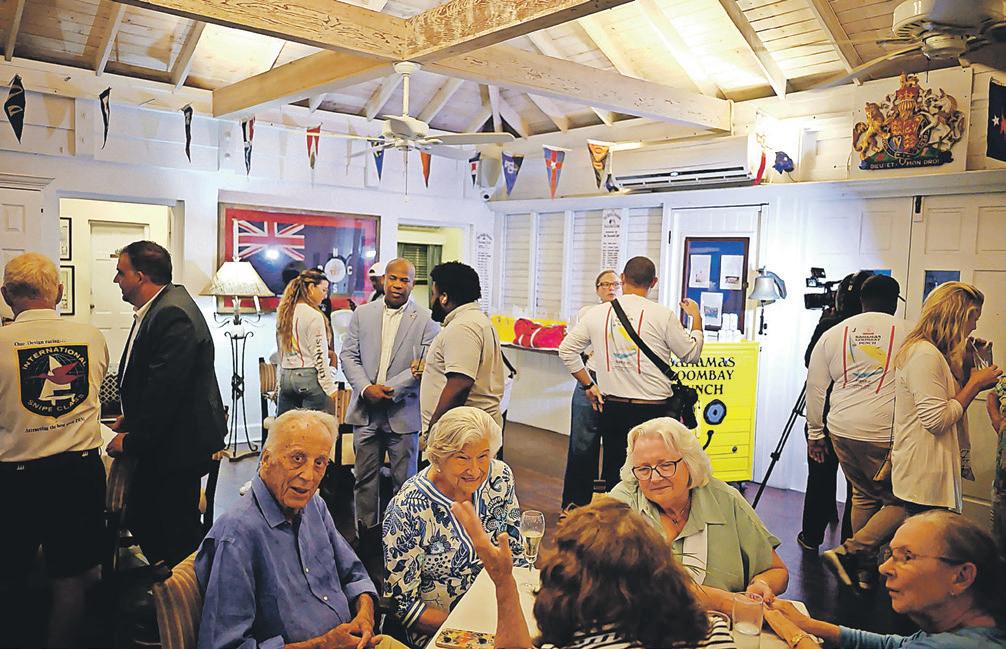




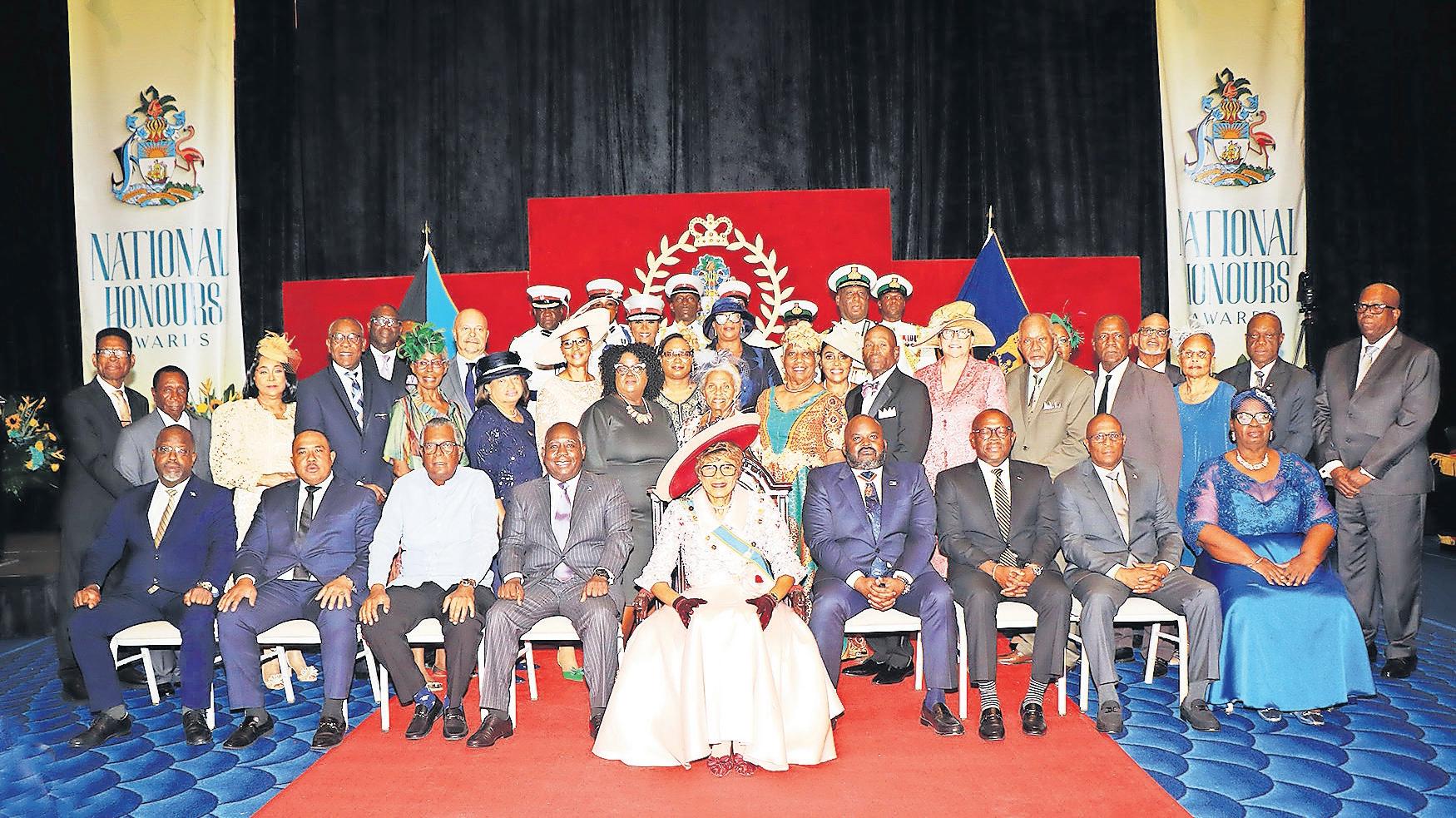

HONOURING THE HEROES OF OUR NATION AT CEREMONY
MORE than 500 people were celebrated for their achievements during the National Heroes Day Investiture of National Honours Ceremony 2025.
Due to the large number of honorees, three separate award ceremonies were held on Monday (observed as National Heroes Day)
at 10am and 4pm; and on Tuesday, at 4pm, at Baha
Mar Convention Centre. Pompey Rolle, who led a slave revolt in the fight for human rights and fair treatment on Exuma in 1830, was designated a “National Hero”.
Pompey headed the list of persons recognised for
their courage, hard work, determination, patriotism, heroism, and sacrifice in developing The Bahamas.
Prime Minister Philip Davis pointed out the common thread that wove the honourees together -that is, love of country and serving others.
“You all have one thing
in common. You chose service over self. You chose to give instead of take. You chose to make this country stronger, kinder, and more hopeful,” the Prime Minister said in his address at all three ceremonies.
Dame Cynthia Pratt, Governor General and Chancellor of the Societies of Honour, beamed with pride and enthusiasm as she presented each honouree a medal, during the ceremonies.
The National Honours categories are: Order of National Hero; Order of The Bahamas, Companion; Order of Excellence; Order of Distinction, Companion;
Order of Distinction, Officer; Order of Distinction, Member; Order of Lignum Vitae; Medals for Acts of Bravery; Order of Merit, Companion; Order of Merit, Officer; Order of Merit, Member; Governor General’s Award – Gold, Silver, and Bronze; and Distinguished Service Medal.

